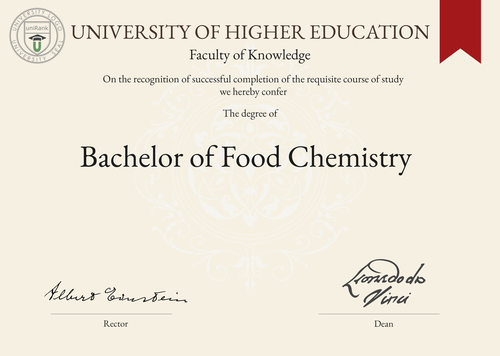
Bachelor of Food Chemistry (BFC)
Guide to University Programs/Courses
Bachelor of Food Chemistry (BFC)

Program/Course Name
Bachelor of Food ChemistryProgram/Course Abbreviation
BFCDuration Range
The duration of the Bachelor of Food Chemistry program typically ranges from 3 to 4 years.Tuition range
The tuition fees for the Bachelor of Food Chemistry program can vary depending on the country and university chosen. It is recommended to check with specific institutions for accurate information.Overview
The Bachelor of Food Chemistry program is designed to provide students with a comprehensive understanding of the chemical and biological aspects of food. It combines principles of chemistry, biochemistry and food science to explore the composition, quality and safety of food products.Curriculum Overview by Year
- Year 1: Introduction to Food Chemistry, General Chemistry, Organic Chemistry, Biology, Mathematics- Year 2: Food Analysis, Food Microbiology, Food Processing, Physical Chemistry, Analytical Chemistry- Year 3: Food Quality Assurance, Food Engineering, Food Preservation, Food Toxicology, Nutritional Chemistry- Year 4: Food Product Development, Food Packaging, Food Regulations, Research Project, InternshipKey Components
The key components of the Bachelor of Food Chemistry program include:- Understanding the chemical and biological properties of food- Analyzing food composition and quality- Evaluating food safety and preservation techniques- Developing new food products and improving existing ones- Applying knowledge of food regulations and standardsCareer Prospects
Graduates of the Bachelor of Food Chemistry program can pursue various career paths in the food industry. Potential job roles include:- Food chemist- Quality control analyst- Food safety specialist- Product development scientist- Food regulatory officerSalary Expectations
The salary expectations for individuals with a Bachelor of Food Chemistry degree can vary depending on factors such as experience, location and job position. On average, food chemists can earn a salary ranging from $40,000 to $80,000 per year. For a more accurate understanding of salary expectations, you can utilize the Job Sites Search Engine, from our sister site jobRank, which searches over 4,600 job sites worldwide. Make sure to specify not only the job title but also the country you are interested in.Conclusions
It is important to note that the duration, tuition fees, curriculum, key components, career prospects and salary expectations of the Bachelor of Food Chemistry program can vary based on the country or location where the program is studied, as well as the chosen university. Prospective students are advised to research and compare different institutions to find the best fit for their educational and career goals.Visitors interested in pursuing a Bachelor of Food Chemistry degree can use the uniRank World Universities Search Engine to search for universities offering this specific degree anywhere in the world.World Universities Search Engine
search for Bachelor of Food Chemistry (BFC) and add the Location (country, state etc.) or specific University you are interested in studying at.
Query examples:
- Bachelor of Food Chemistry (BFC) United States
- Bachelor of Food Chemistry (BFC) United Kingdom online
- Bachelor of Food Chemistry (BFC) Australia international students
- Bachelor of Food Chemistry (BFC) University of California
- Bachelor of Food Chemistry (BFC) University of London tuition fees
- Bachelor of Food Chemistry (BFC) University of Sydney scholarships